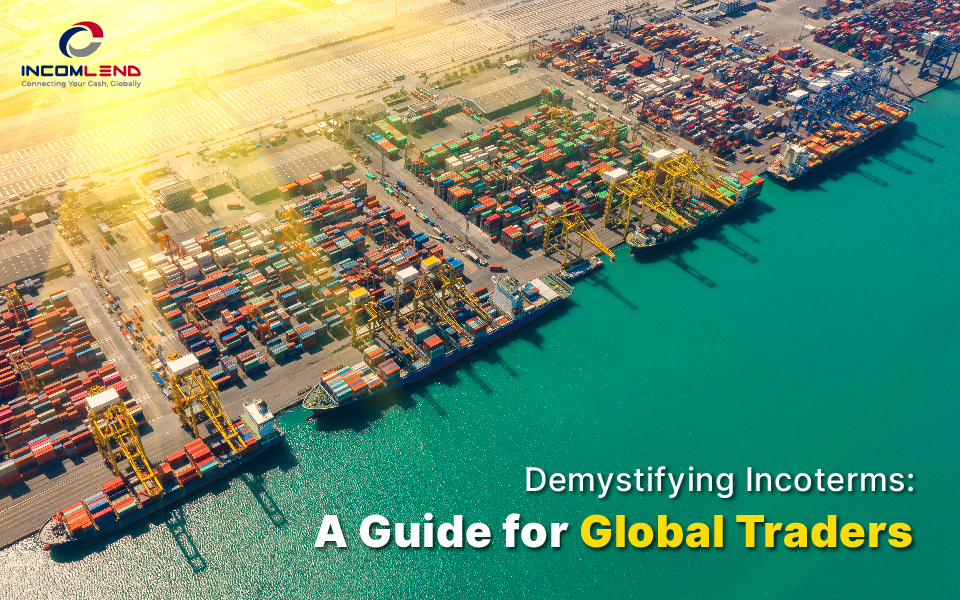Demystifying Incoterms: A Guide for Global Traders
July 12, 2023
Exporters and importers must traverse a complex web of regulations and processes in the world of international trade. Understanding Incoterms is an important part of this procedure. But what are Incoterms, and why do exporters and importers need to know about them? In this post, we will debunk Incoterms, explain their meaning, and look at how they are used in trade finance around the world.
What are Incoterms?
Incoterms are a set of standardised regulations established by the International Chamber of Commerce (ICC). These rules specify the obligations, risks, and expenses connected with international commerce transactions involving the transportation and delivery of commodities. Incoterms guarantee that both parties involved in a transaction understand their responsibilities, reducing misunderstandings and disagreements.
Why are Incoterms so important to exporters and importers?
1. Clarity and Communication: Incoterms serve as a common language for exporters and importers, ensuring that all parties involved understand the trade’s terms and circumstances. Incoterms remove ambiguity and encourage successful communication by defining each party’s duties.
2. Risk and Cost Allocation: Understanding Incoterms assists exporters and importers in determining who bears the risks and expenses involved with goods transportation, insurance, and customs clearance. Unexpected expenses and disagreements are avoided when these duties are clearly defined, allowing traders to make educated judgements.
3. Legal Compliance: Because Incoterms are widely recognised and acknowledged in international trade, they are an important instrument for guaranteeing legal compliance. Exporters and importers can negotiate complex customs procedures and complete their legal duties by following these principles.
The Use of Incoterms in Global Trade and Finance:
1. Global Consistency: Incoterms are generally recognised and used throughout the world. They make trade activities run more smoothly by offering a standardised framework that crosses cultural, legal, and linguistic obstacles. Incoterms ensure a shared understanding of trade obligations whether you’re trading with partners in Europe, Asia, or anywhere else in the world.
2. Trade Finance: Incoterms are important in trade finance because they determine when ownership and risk move from the seller to the buyer. When granting letters of credit or other trade finance instruments, banks and financial institutions need this information. Incoterms reduce financial risks and promote secure payment processes by precisely specifying the parameters of the transaction.
3. Selecting the proper Incoterm: Exporters and importers must carefully choose the proper Incoterm for their individual trade transaction. This decision is influenced by factors such as the nature of the commodities, the desired level of control, and the buyer-seller relationship. Understanding the various Incoterms and their ramifications allows merchants to negotiate better terms and maintain a smooth and efficient supply chain.
What are the Incoterms used in global trade finance?
1. EXW (Ex Works):
The seller makes the goods available at their premises, and the buyer is responsible for all transportation, customs clearance, and risk from that point onward.
2. FCA (Free Carrier):
The seller delivers the goods to a carrier or another nominated party at a specified location. The buyer is responsible for transportation and any costs incurred after delivery.
3. CPT (Carriage Paid To):
The seller arranges and pays for the transportation of goods to the agreed-upon destination. However, the risk transfers to the buyer once the goods are handed over to the carrier.
4. CIP (Carriage and Insurance Paid To):
Similar to CPT, the seller is responsible for transportation to the agreed destination and also arranges insurance against the buyer’s risk of loss or damage during transit.
5. DAP (Delivered at Place):
The seller delivers the goods to the buyer at a specified location, ready for unloading. The seller bears the risks and costs of transportation to that point, excluding import customs clearance.
6. DDP (Delivered Duty Paid):
The seller is responsible for delivering the goods to the buyer, ready for unloading, and assumes all risks and costs, including customs duties and taxes.
7. FAS (Free Alongside Ship):
The seller is responsible for delivering the goods alongside the vessel at the specified port of shipment. The buyer assumes all risks and costs from that point, including loading the goods onto the ship and clearing customs.
8. FOB (Free on Board):
The seller is responsible for delivering the goods on board the vessel at the specified port of shipment. The buyer assumes all risks and costs from that point, including transportation, insurance, and customs clearance.
9. CFR (Cost and Freight):
The seller arranges and pays for the transportation of goods to the specified port of destination. However, the risk transfers to the buyer once the goods are on board the vessel.
10. CIF (Cost, Insurance, and Freight):
Similar to CFR, the seller arranges transportation to the specified port of destination and also provides insurance against the buyer’s risk of loss or damage during transit.
11. CIP (Carriage and Insurance Paid):
The seller is responsible for the carriage and insurance of goods to the agreed destination. The risk transfers to the buyer when the goods are handed over to the carrier.
Conclusion:
In the dynamic world of international trade, Incoterms serve as a vital tool for exporters and importers. As you venture into the exciting realm of global trade, take the time to familiarize yourself with Incoterms. They will empower you to make informed decisions, mitigate risks, and build successful business relationships across borders.
